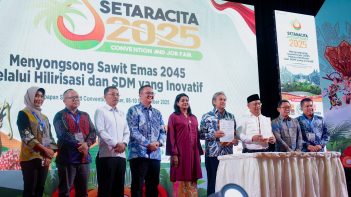The implementation period of GHG emissions reporting to RSPO using RSPO PalmGHG calculator or an approved equivalent tool for compliance to Indicator 5.6.3 of RSPO P&C (2013) ends on 31st December 2016. As of 1st January 2017, public reporting of GHG emissions is mandatory as part of the annual audit summary report published on the RSPO Website.
The RSPO Emission Reduction Working Group has assessed the PalmGHG V2.1.1 submissions and feedback from participating companies and based on the pilot results, a new and improved version of the calculator is available as PalmGHG V3.0.1.
The RSPO PalmGHG Calculator Version 3.0.1 (or an approved equivalent) shall be used to calculate emissions from estate and mill operations including GHG emissions from any land use changes after November 2005. Independent smallholders are encouraged to use RSPO PalmGHG Calculator Version 3.0.1 to calculate emissions from operations, however, it is not mandatory.
As part of public reporting, the following information and data are required to be verified by auditors and presented under C5.6 of assessment findings in the annual audit summary report. The following data and information can be obtained from the PalmGHG calculator.
| Emissions per Product | tCO2e/tProduct |
| CPO | |
| PK |
| Extraction | % |
| OER | |
| KER |
| Production | t/yr |
| FFB Processed | |
| CPO Produced |
| Land Use | ha |
| OP planted area | |
| OP planted on peat | |
| Conservation (forested) | |
| Conservation (non-forested) | |
| Total |
| Own Crop | Group | 3rd Party | Total | |||||
| tCO2e | tCO2e/tFFB | tCO2e | tCO2e/tFFB | tCO2e | tCO2e/tFFB | tCO2e | tCO2e/tFFB | |
| Emissions | ||||||||
| Land Conversion | ||||||||
| *CO2 Emissions from Fertiliser | ||||||||
| **N2O Emissions | ||||||||
| Fuel Consumption | ||||||||
| Peat Oxidation | ||||||||
| Sinks | ||||||||
| Crop Sequestration | ||||||||
| Conservation Sequestration | ||||||||
| Total |
| tCO2e | tCo2e/tFFB | |
| Emissions | ||
| POME | ||
| Fuel Consumption | ||
| Grid Electricity Utilisation | ||
| Credits | ||
| Export of Grid Electricity | ||
| Sales of PKS | ||
| Sales of EFB | ||
| Total |
Palm Oil Mill Effluent (POME) Treatment
| Divert to compost | % |
| Divert to anaerobic digestion | % |
POME Diverted to Anaerobic Digestion:
| Divert to anaerobic pond | % |
| Divert to methane capture (flaring) | % |
| Divert to methane capture (electricity generation) | % |
Submission of PalmGHG reports to the RSPO Secretariat is highly recommended to enable continued review on the use of the tool, to facilitate analysis of data and to inform future revision of the PalmGHG calculator.
Keep reading
RSPO accepted in the Netherlands as a private control system for EUDR

RSPO x JaSPON Conference and Member Engagement Forum 2025 Spotlights Japan’s Sustainability Success and Market Growth
Call for Expression of Interest: Independent Investigation of a Complaint
Call for Expression of Interest: Mexico National Interpretation Task Force for 2024 RSPO Principles and Criteria (RSPO P&C) and Independent Smallholder (ISH) Standard

RSPO–APKASINDO Partnership to Boost Inclusive Growth, Certification, and Market Access for Oil Palm Smallholders

Open Letter to COP30 President: Integrating Forests and Biodiversity: A Policy Central to Paris Agreement Success

Bridging the Auditing Divide: Key Takeaways from the RSPO Assurance Forum 11

Extension of RSPO Excellence Awards 2025 Submission Deadline!





